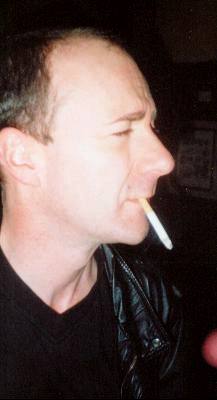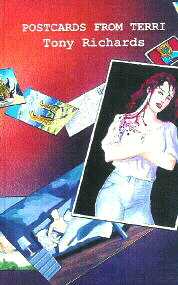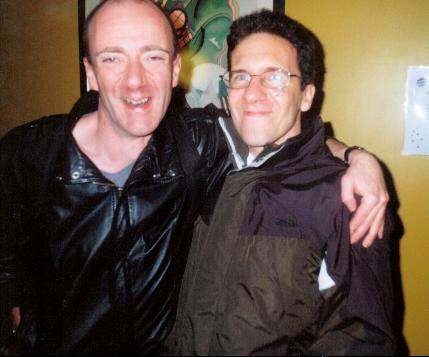
Tony Richards is a veteran of horror writing who has been working in the genre for years. His books include the novels Night Feast and more recently Postcards from Terri, which was introduced by Ramsey Campbell....
Paul Kane: Can you give us some background about yourself personally and as a writer?

Tony Richards: I was born in 1956 in Greenford, West London - to a completely non-artistic family - and have lived in various different areas of London my whole life. Was educated first at a very ordinary primary school, then won a state-assisted place to a public day school, UCS in Hampstead, where I suddenly found myself surrounded by a lot of prep-school educated kids from well-heeled families - a disconcerting social shift which I've just been describing in a new short novel that I'm working on called No-Man. Studied law at college, but had realised by my second year I didn't want to be a lawyer - in fact, there's only one thing I ever really wanted to do, and I'm doing it right now. I started trying to write professionally about six months before I was due to be turfed out into the big wide world, and sold my first story a couple of months after leaving college. I worked for a legal publisher for a number of years, and have been a freelance writer ever since, filling in with a variety of odd part-time jobs when financial necessity demands it. And I travel an awful lot, which provides a good deal of the background and the settings for my work. In terms of writing, I've sold over forty short stories and have appeared in almost all the major markets. My first book, The Harvest Bride, was nominated for a Bram for best first novel. A second book, Night Feast, appeared a few years later from Pan. And there should have been a third, but the big horror slump hit just about then, Pan cut its genre list, and Hot Blood never appeared, despite reaching proof stage. As you can guess, I found that terribly frustrating. I'm writing pretty much full-time at the moment, and live in North London with my wife.
Paul Kane: What was your first story sale and what inspired the idea?
Tony Richards: It was an sf story called 'Out of an Ocean, Long Ago', back when I was twenty one, to a long defunct anthology series called 'Space'. As to your second question, that was more than two decades ago and I don't have the first clue. Not wanting to be a lawyer, perhaps?
Paul Kane:What do you think makes a good genre writer?
Tony Richards: First and foremost, particularly in our genre, attention to prose style. Horror has an unfair reputation for being badly-written junk - a book editor came back to me once with the comment 'this is too well-written for a horror novel', and how on earth are you supposed to respond to that, except perhaps with a length of two-by-four? - and writers who live up to that old stereotype sell the rest of us badly short. Secondly, a willingness to experiment with and stretch the boundaries of the genre - slipstream fiction I believe, is very crucial in this. Thirdly, though every genre writer turns out a few tales simply to entertain - and I'm certainly no exception - trying to say something important about the human condition, or simply trying to make the reader stop and think about something in a slightly different way, is vital if we're ever going to stop being seen as a 'despised' genre.
Paul Kane:Do you have any literary heroes?
Tony Richards:
In terms of dark-fantasy writers, Bradbury, the extraordinary and much-missed Fritz Leiber, and I used to be a massive fan of Harlan Ellison, who influenced me very strongly in my early years. Outside the genre, Chandler (my first novel was Chandleresque), Hammett (not simply because of his writing but because I find him admirable as a person; he actually had lived what he wrote about, and was a man of extremely strong principles). The real point about both these guys is that they managed to convince people a previously despised genre was actually worth reading. And - not at all PC these days, but to hell with it - Hemingway, who at his best was, I think, a true giant and capable of being incredibly moving. And I'm a huge admirer of Dorothy Parker too - there are a few touches of that kind of humour in Postcards from Terri. Oh, and did I forget to mention Steinbeck, arguably the greatest writer of the last century.
And yes, I do realise that almost all of these guys are Americans who had their heydays between the Thirties and the Fifties. But that was the period during which authors really began writing the same way that people talk, and that's probably been the biggest influence on me of all.
Paul Kane: If you were a novel, what title would you be?
Tony Richards: WHAT'S GOING ON? Because, even at my age, I can rarely make much real cohesive sense of the world around me or why people behave the way they do. Maybe writing is my attempt to figure all that out. And maybe I keep on writing such a lot because I still haven't succeeded. It bugs me something fierce, for instance, that genetic programming still seems to play such a huge role in the way that we react towards each other - haven't we grown any cleverer than that, or are we trapped forever by the pack-dwelling animal inside us, with its hierarchies, silly mating rituals, and territorial aggression? It annoys me even worse that I'm probably no big exception.
Paul Kane: What is your favourite short story and novel?
Tony Richards: My favourite short story - Ray Bradbury's 'The Scythe' from 'The October Country', a classic and imaginative piece of Americana - kind of Steinbeck meets The Twilight Zone - which could comfortably hold its own in a collection of short fiction by American literary greats. Runner up? Harlan Ellison's 'Pretty Maggie Moneyeyes', which is entirely about the people in it and people in general, and ends with a finale of incredible sad elegance. Favourite novel? No such thing. Favourite in what way? Most entertaining? Funniest? Most serious? And serious in what way? I think Camus' 'The Outsider' is the most important novel I've ever read. And Poppy Brite's 'Lost Souls' knocked my socks off. But then so did 'The Old Man and the Sea' and 'A Farewell to Arms'. John O'Brien's 'Leaving Las Vegas', the ending of which leaves the reader emotionally crippled? T.H. White's 'The Once and Future King'? Isherwood's 'Goodbye to Berlin'? 'The Grapes of Wrath'? I don't have a favourite novel -- I've probably got dozens of them, all for different reasons.

Paul Kane: Can you tell us a bit more about your latest release from Sarob?
Tony Richards:It's called Postcards from Terri, and is a 35,000 word supernatural novel. I'd never considered writing to this length before, but Robert Morgan - who runs Sarob - got in touch with me one day and said 'I've started publishing books of this length, how about you give one a go?' So I went 'okay' and just sat down and the whole thing flowed from my fingertips like water. I found that length a terrific one to work to - all the passion and immediacy of writing a short story, yet with room to digress - and have repeated the trick once already - Sarob are publishing my next, Under the Ice, in 2005.The plot concerns an unadventurous male scriptwriter whose best friend from college - Terri Campion - has travelled the world, been everywhere, done everything. Then she dies - and comes back to visit him in spirit form. Except that she has an agenda. Essentially, the book is a kind of schizophrenic autobiography, taking in two separate sides of my own personality. There's the bookish side, which sits at home writing and reading and thinking vaguely serious thoughts, which is the Steve character. And then there's -- and I'd never claim to have done as much as Terri - the side of me which gives the other guy something to really write about. Which has seen a lot of the world and been in some interesting situations - all the way from travelling across the Militarised Zone in Nicaragua - mostly with army convoys - during the Sandinista-Contra war (I was writing it up for Tribune), to going across part of Africa, on my own, in a very cranky Land Rover one-ton truck, to hanging out with various jazz and indie bands - and met a lot of fascinating people along the way. A good number of the overseas scenes in the novel are based on my own experiences. I realised most of the 'schizo-autobiography' stuff in retrospect, naturally. The worst idea of all is to pschoanalyse your work while you're writing it.
Paul Kane: Do you attend many conventions and do you enjoy meeting other writers?
Tony Richards: I've just the last couple of years started getting back into that scene, after a long absence. And yes, I usually have a great time and am very pleased to meet new people. As for writers specifically, that's a bit like asking a plumber whether he likes meeting other plumbers. It depends on the person. I don't feel automatically joined at the hip with someone because he or she happens to write. But I've made a few very good friends recently - bright, talented, quick-witted people - and finally getting together with Ramsey Campbell at Fantasycon was a genuine treat. He wrote the foreword for Postcards, incidentally.

Paul Kane: Do you plan out your books and stories in detail or do you write in a 'stream of consciousness' way?
Tony Richards: That's an interestingly-timed question, because a couple of months back I was negotiating to write an 'original novelisation' - which means a new novel based on the characters and ideas of a previous film - and I ended up turning in a seven-page single-spaced treatment. Which is something I usually never do! I've actually lost work before through my inability to hand in a competent synopsis. So how'd that seven-page thingumy happen? Well firstly, since the proposed book is based on a movie, I was able simply to visualise it as one. Secondly, it's action-driven rather than character-driven, which I think is where the main problem arises. Would I be immodest if I said my own work is mostly character-driven? But I think so - I start with a basic idea and a person, and just see where it goes from there. That boring old cliche about 'the character taking on a life of his own' is absolutely true, to the chagrin of those of us who hate boring old cliches. So it's very hard for me to plan ahead in the usual course of things. Sometimes I at least know what the ending is going to be, and work towards that. Sometimes I don't. And sometimes I change my mind. What I was saying before about finding it hard to figure people out? That counts doubled for myself.
Paul Kane: Do you have any major ambitions for the future?
Tony Richards: : My best wish would be - and I say this with all possible respect for the wonderful small presses who've continued to support us; they've been absolute lifesavers, and God (or whoever) bless them all - that this awful horror publishing slump would finally come to an end and I and writers like me could start getting our work out into the general market-place again. When I tell people who don't understand what has happened over the past few years, they invariably go: 'What, but there are scads of horror movies out there these days! Why aren't the big publishers catching on to this?" and that's a bloody good question if ever I heard one.
Paul Kane: Thanks very much for the interview, Tony.
Tony Richards: Thanks Paul..
Visit Tony Richards' website at
http://www.richardsreality.com
Interview (C) Paul Kane & Tony Richards, 2004.